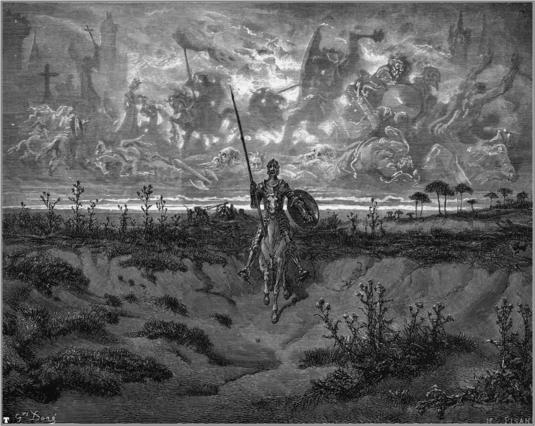Dialectics of Adventure in the Early Modern Period: Ariosto and Cervantes
Comparative Literature and Literary Theory, LMU Munich
Principal Investigator: Prof. Dr. Martin von Koppenfels
Research Staff: Dr. Manuel Mühlbacher

Illustration von Gustave Doré zu Cervantes’ Don Quijote, 1863.
This project aims at a parallel reading of Ariosto’s Orlando furioso (1516/32) and Cervantes’ Don Quijote (1605/15) and thus engages with two texts that constitute crucial links in the chain of textual transmission running from medieval aventure to the modern novel. Reflecting on adventure, both authors determine the form in which its paradoxes have been passed on to literary modernity. Our project argues that Ariosto and Cervantes split the pattern of adventure into several conflicting varieties of adventurousness. This procedure can be described as a process of polarization that takes certain aspects of adventure to the extreme and pits them against each other. Adventure thereby undergoes a narratively performed analysis and serves as a starting point for new modes of reflexive storytelling. Building on and specifying the research questions of the first funding period, the project now focusses on the tension between adventure and violence. This includes specifically adventurous ways of depicting violence as well as modes of representation that assimilate traumatic experience and thus exceed the limits of adventure, but also define them from ‘outside’. Exacerbating the polarities of adventure, Ariosto and Cervantes eventually reach its borderline and explore the zone where adventure merges with other genres and narrative patterns or clashes with experiences that are located beyond its reach.
We explore the tension between adventure and its respective opposites in two focus areas. Martin von Koppenfels investigates the ‘Mediterranean adventure genre’ in the embedded narratives of the Don Quijote, taking into account a corpus of factual narrations and autobiographic testimonies related to naval warfare in the Mediterranean around 1600. Some of these documents made their way into the intertextual structure of the Quijote, where they interact with different traditions of literary adventure. Manuel Mühlbacher examines the relationship between adventure and wounding in the Furioso and the Quijote. Developing a narratological theory of the adventurous wound, he will set out to show how Ariosto and Cervantes parody the ‘traceless’ passing of adventure and how they end up taking it to and beyond its limits.

